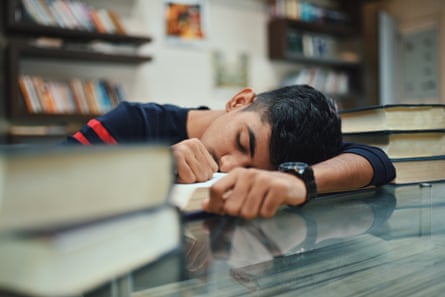For many American teenagers, high school means trying desperately to understand algebra or chemistry in the 7am hour, fending off the urge to use your books, or your neighbor, as a pillow. But for kids in California, things may be looking up.
On 1 July, a state law took effect that protects most high school students from having to start class before 8.30am – the first law of its kind nationwide. Other states, including New York and New Jersey, are considering similar measures for teens, who naturally want to go to bed and get up later than adults do.
According to Beth Ann Malow, a neurologist and sleep expert at Vanderbilt University Medical Center, that’s a good thing. “We know that when kids get more sleep, they’re healthier. They’re more alert at school. Both their physical health, including their weight, their risk for diabetes, as well as their mental health, how they feel emotionally – all that improves when they’re getting more sleep.”
It’s a matter of circadian rhythms, the 24-hour patterns that regulate our biological cycles, explains Phil Gehrman, a clinical psychologist who specializes in sleep at the University of Pennsylvania. “When we hit puberty, our rhythms start to shift later,” he says. “They delay by an average of about two to three hours.”
On top of that, teens need a little more sleep than adults: eight or nine hours to adults’ seven or eight, Malow says.
Beyond the sleep deprivation, early class times may not be conducive to learning. Given the circadian rhythms, students’ energy is “higher now at nine o’clock, 10 o’clock at night and they really are not awake until eight o’clock” in the morning, Malow says.
The University of California, Berkeley, sleep expert Matthew Walker went even further in an interview with NPR this summer. “Asking a teenager to be awake and trying to absorb information at 8.30 in the morning in some ways is like asking an adult to wake up at 4 o’clock in the morning with good grace, good humor, positive mood and start learning information efficiently.”

But the law, signed in 2019 by Governor Gavin Newsom, also has its detractors. While the California State Parent Teacher Association (PTA) supports it, several other school associations, including the California Teachers Association (CTA) union, oppose it.
Lower-income students in particular could be harmed by the bill, the CTA said in a statement to the Los Angeles Times, especially those whose parents “don’t have the option of starting their workday later … We know from experience that many of these parents will drop their children off at school at the same time they do now, regardless of whether there is supervision.”
Then there are concerns about the impacts on after-school activities. “It’s been really hard for students to get out of school late,” Allison Dana, a Bay Area high schooler, told Teen Vogue. She struggles to reach an after-school internship on time and has had to pick and choose between sports with conflicting practices.
Finally, there are questions of bussing in states considering such measures. Given the limited number of vehicles a district has, schools may need to stagger schedules among elementary, middle and high school students. And while, “from a circadian rhythms perspective”, having the youngest kids attend school the earliest makes sense, “no one wants fifth-graders standing out at the bus stop when it’s pitch black for a lot of the year”, Gehrman says.
“In theory, it sounds like, ‘Oh, yeah. What’s the big deal?’ But it can be very complicated. And the complexities for one family are different from the complexities for another,” he adds.
Still, from a purely health-focused perspective, Gehrman, like Malow, believes laws like California’s are a good idea. “In teens, the strong associations often are with mental health, depression, in particular, anxiety, increased rates of substance use,” he says.
“The way I think about it,” he says, is that an early start time “just creates this general vulnerability to different mental health problems. And so depending on what else is going on in your life, or what other biological vulnerabilities you may have – the circadian rhythm issues kind of amplify other problems that might be going on.”

That could be a particular issue at a time when students are experiencing worsening mental health. A CDC survey published in March found that 37.1% of high schoolers “experienced poor mental health” amid the pandemic, with 44.2% having “persistent feelings of sadness or hopelessness” and 19.9% having “seriously considered suicide”. Such concerns were already growing before the pandemic, the agency said.
“The problem was already building for a variety of reasons, many of which we don’t really know. But the pandemic just put it on steroids,” Gehrman says. “Anything that we can do to reduce mental health risk in teens right now is just such a high priority.”
As a school counselor at Fresno Unified school district and a parent of high schoolers herself, Anita Hernandez has gotten to see the changes up close. She says the law “didn’t really solve the problem [of sleep deprivation], because for those parents who still have to be at work at eight o’clock, we still have to wake our kids up early”, she says, given limited or non-existent bussing. And managing mentoring, sports and other after-school activities has become more difficult given limited free time in the afternoons.
As for student response, Hernandez says, it’s been a mixed bag.
Her son Lucas Hernandez, an 11th grader at Clovis East high school in Clovis, California, typically began school at 7.40 last year; this year, it’s 8.30. “I do like the later start because I am not a morning person,” he says. Marching band and homework keep him up late, he says, so the chance to sleep in “does benefit me personally”.
But “surprisingly, a lot of people I know say they don’t like it”, he says, because they get out of school at 3.15pm instead of 2.40 – like Dana, they miss the earlier departure.
His brother, Aiden, a ninth-grader at Patino high school in nearby Fresno, now starts school at 9am and is among those frustrated by the later afternoons. Still, he says, if he had the power to change things back, he probably wouldn’t: “I do like sleeping in.”
